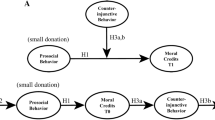Abstract
After a discussion of the evolution and criticisms of state run lotteries, this article examines the ethics of lottery advertising. A discussion of the appeals used by lottery advertisers is followed by evidence concerning the impact of expected value information on lottery purchase intentions. Findings point toward less emphasis on the lottery as a solution to financial and job problems and more emphasis on information about the actual value of a lottery bet. Using accepted standards from the marketing literature, lottery advertising is found to be deceptive.
Similar content being viewed by others
References
Advertising Age: 1993, ‘Clean Up Lottery Ads’, Advertising Age Editorial,Advertising Age, May 17, 20.
Bol, J. W., C. T. Crespy, J. M. Stearns and J. Walton: 1991, ‘Contemporary Problem: State Lotteries’,The Integration of Ethics Into the Marketing Curriculum: An Educator's Guide (Ginn Press, Needham Heights), 79–81.
Calonius, E.: 1991, ‘The Big Payoff from Lotteries’,Forbes, March 25, 109–114.
Clotfelder, C. T. and P. J. Cook: 1989,Selling Hope: State Lotteries in America (Harvard University Press, Cambridge).
Cohen, D.: 1974, ‘The Concept of Unfairness As It Relates to Advertising’,Journal of Marketing, July, 8–13.
Cook, J.: 1989, ‘Lottomania’,Forbes, March 6, 92–96.
Crain, R.: 1993, ‘Advertising To End All Advertising’,Advertising Age, May 17, 28.
Daniel, W. and J. Terrel: 1989,Business Statistics for Management and Economics, 5th edition (Houghton Mifflin, Boston).
Fauman, B. and C. Weinberg: 1989, ‘Jefferson State Lottery’, in L. Christopher and C. Weinberg (eds.),Marketing Challenges: Cases and Exercises, 2nd edition (McGraw Hill, New York).
Gardner, D.: 1975, ‘Deception in Advertising: A Conceptual Approach’,Journal of Marketing, Jan., 40–46.
Hoover, W. D.: 1990,Middletown Revisited (Ball State University Press, Muncie, Indiana).
Jacoby, J. and C. Small: 1975, ‘The FDA Approach to Defining Misleading Advertising’,Journal of Marketing, Oct., 65–68.
Karcher, A. J.: 1989,Lotteries (Transaction Publishers, New Brunswick, NJ).
Kennedy, E.: 1991, ‘Gaming and the Moral Bottom Line’,Chicago Tribune, Nov. 14, section 1, 13.
Marriott, M.: 1992, ‘Fervid Debate on Gambling: Disease or Moral Weakness?’,New York Times, Nov. 21, 1 and 8.
Michalos, A. C.: 1992, ‘Advertising: Its Logic, Ethics and Economics’, in D. C. Poff and W. Waluchow (eds.),Business Ethics in Canada, 2nd edition (Prentice-Hall, Canada), 455–468.
Olson, J. C. and P. A. Dover: 1978, ‘Cognitive Effects of Deceptive Advertising’,Journal of Marketing, Feb., 29–38.
Russo, J. E., B. Metcalf and D. Stephens: 1981, ‘Identifying Misleading Advertising’,Journal of Consumer Research, Sept., 119–131.
Selinger, I. C.: 1993, ‘The Big Gamble’,Advertising Age, May 10, 22–28.
Author information
Authors and Affiliations
Additional information
Shaheen Borna is Professor of Marketing at Ball State University. He has a DBA. His articles have appeared in theJournal of Business Ethics, Journal of Health Care Marketing, British Journal of Criminology, Journal of Accountancy, Akron Business and Economic Review, andProceedings of the American Marketing Associations.
James M. Stearns is Associate Professor of Marketing at Miami University, Oxford, Ohio. Dr. Stearns is co-author ofThe Integration of Ethics into the Marketing Curriculum: An Educator's Guide andMarketing Ethics: An Annotated Bibliography. He is co-editor ofReadings in Marketing Ethics. Dr. Stearns' current research interests are the use and portrayal of the elderly in advertising, ethical and unethical behavior in academe, and the impact of technology on marketing curriculum.
Rights and permissions
About this article
Cite this article
Stearns, J.M., Borna, S. The ethics of lottery advertising: Issues and evidence. J Bus Ethics 14, 43–51 (1995). https://doi.org/10.1007/BF00873735
Issue Date:
DOI: https://doi.org/10.1007/BF00873735




